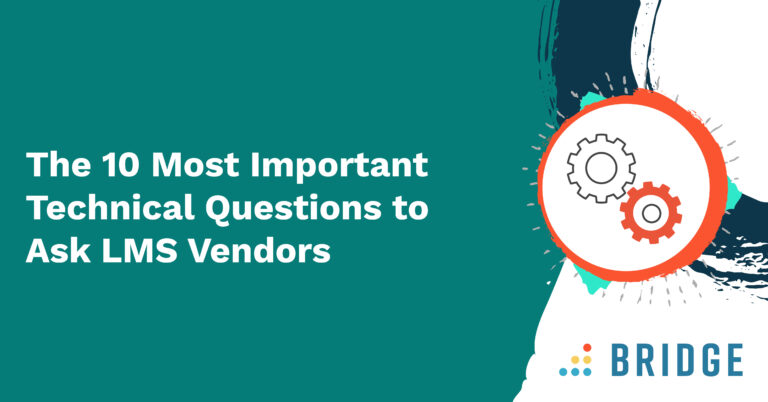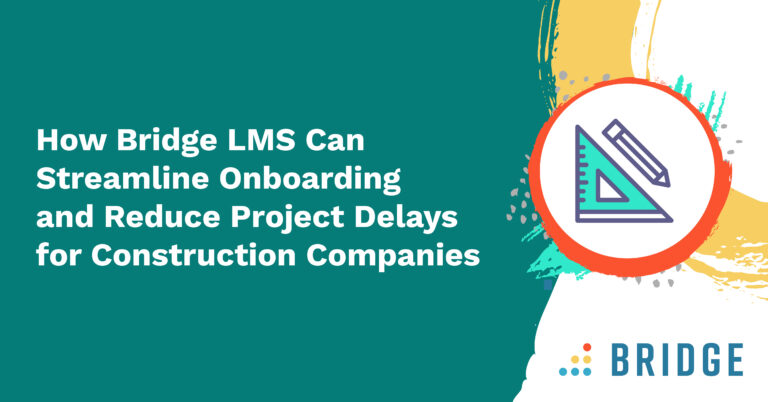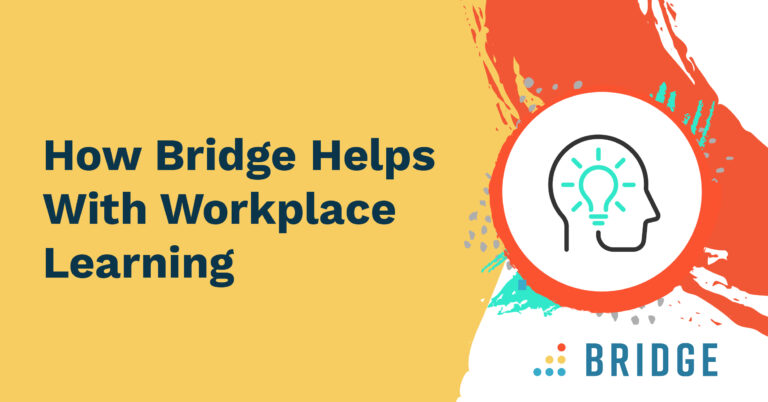When buying a learning management system, you need to know that you’re making the best choice for your business and end users.
Close collaboration between IT and HR teams during the selection process helps you understand the essential features to look for in an LMS and choose a solution that meets these needs.
Keep reading to discover the factors IT teams should consider during a tech purchase and a list of questions to ask LMS providers during software demos.
The Importance of Vetting Your Software Vendors
Over half of software buyers anticipate that their tech spending will increase in 2024 and into 2025, according to a survey of over 1,900 B2B buyers in G2's 2024 Buyer Behavior Report.
While this could indicate business leaders are more likely to give the go-ahead for tech purchases, respondents also say that their execs are scrutinizing these investments more closely than ever before. Business leaders’ top priorities include sourcing software solutions that deliver a quick ROI, and improving employee productivity.
When your organization makes a tech purchase, you need to be confident that you understand the goal and that the solution you choose will satisfy the needs of your exec team.
IT teams are increasingly influencing software purchasing decisions and taking ownership of showcasing the value. As survey responses from IT professionals in one Asana report indicate, roles are becoming more focused on strategic objectives and aligning tech initiatives closely with business goals. Looking to the future, 77% of IT pros expect to be responsible for leading tech-based transformations.
In addition, IT leaders in top-performing organizations are proactively evaluating their tech stack to ensure each solution is modern and aligned with business and employee needs. To do this, they're taking the following actions:
- Selecting technology vendors that don’t just supply technologies but also serve as strategic partners
- Forging close partnerships with key stakeholders to ensure technology supports business goals
To ensure you consider all of the essential criteria during the evaluation and selection process, you must ask the right questions. Use the questions below to guide discussions and demos with LMS providers and find a solution that fits.
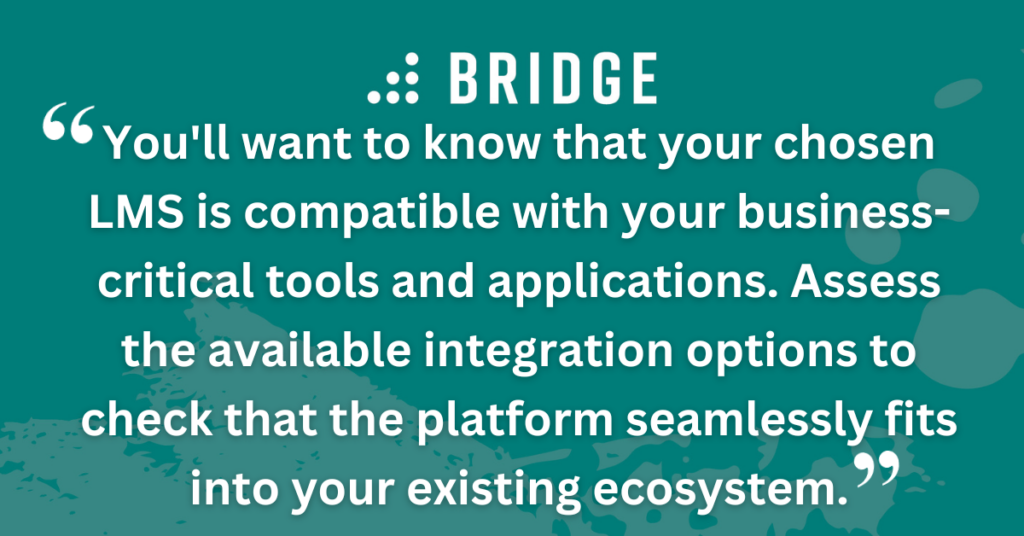
Technical Considerations
Evaluating the standards an LMS uses, and the level of support you can expect for implementation and operation, helps to ensure that your chosen tool is easy to maintain and seamlessly fits into your existing ecosystem. This, in turn, will support your strategic objectives.
1) How Does the Learning Management System Keep Data Secure?
An LMSs handles a large amount of personal data, so you must be confident that a solution will provide a secure environment.
Review the measures and data protocols in place to determine whether a provider's hosting and security comply with your industry standards.
You should also ask about security features such as:
- Data encryption
- User roles and permissions
- Storage and data backups
- Two-factor authentication (2FA)
- SSL certificates
ADDITIONAL INSIGHTS | ‘Hey, IT Teams: Here Are 6 Questions to Ask Before Purchasing an LMS’
2) Will the LMS Integrate With Our Existing Ecosystem?
You'll want to know that your chosen LMS is compatible with your business-critical tools and applications. Assess the available integration options to check that the platform seamlessly fits into your existing ecosystem.
You should also check that a platform supports industry standards such as SCORM, so content can be easily exported.
To maximize integration with your existing tech, ask about capabilities such as:
- The ability to exchange employee data from your HRIS
- Single sign-on (SSO)
- Custom APIs and webhooks
- eCommerce and storefronts
- Messaging applications
- Off-the-shelf content and third-party content providers
WANT TO LEARN MORE? | ‘IT Professionals: Here Are 3 Ways a Consolidated HR Infrastructure Addresses Tech Overload’
3) What Level of Support Do You Provide Customers?
To get the most out of your software investment, you need a partner who understands your business. Find out how an LMS provider will support your team and users with troubleshooting and help you get the most out of the solution.
You'll want to know what the implementation process will look like and the level of support you'll receive throughout. A dedicated point of contact can simplify any complexities and minimize potential disruptions.
Beyond onboarding your new software, you'll also want to be sure that a vendor is reliable and readily available to offer ongoing support to your team and end users.
Ask about some of the following to learn more about vendor support and services:
- Access to customer training
- Guaranteed platform uptime
- Average response time from customer support
- The number of customer service channels
- The level of onboarding support offered

4) Will the LMS Scale and Grow With My Organization?
When evaluating LMS providers, consider your organization's current and future requirements and how well each LMS provider is equipped to meet them.
You should check how easily the platform will scale to accommodate additional users or products, how often updates are released, and any details about its product roadmap.
Additionally, it might be helpful to ask about some of the following:
- The pricing model and structure
- Other products the vendor offers
- Whether vendors use customer feedback to influence direction
- Upcoming updates and maintenance
READ ABOUT THE BUSINESS BENEFITS OF AN LMS | ‘Go Beyond Compliance Training: How an LMS Can Drive a Learning Culture’
LMS Features and Functionality for HR and L&D Teams
Your HR and L&D (learning and development) stakeholders are most likely to be leading the search for an LMS. As such, they'll have a clear idea about what they're looking for in a solution. Nonetheless, it’s critical that you understand the kinds of questions they should be asking, and why they need to ask them.
5) Can Authors Easily Create and Deploy Content?
The ability to create and administer content is fundamental for any L&D team. Finding an intuitive platform with engaging and interactive content creation capabilities allows authors to build and roll out multimedia courses without in-depth technical or instructional design experience.
A robust system should offer a suite of course creation features with adaptable and customizable templates.
To evaluate course creation and management features, you might want to ask more specific questions about elements such as:
- Customization and automation of learning
- The ability to organize content within the library
- Video creation capabilities such as auto-captioning and translation
- Access to premade templates, assessments, and quizzes
- The ability to schedule webinars and live training events
6) How Much of the Administrative Process Can Be Automated?
An LMS can help reduce administrative workload through automation. Time saved on manual tasks such as deploying L&D pathways, managing courses and assessments, and tracking training progress frees up teams to focus on strategic work.
Selecting a platform that allows admins to configure and automate processes in a single secure location can also reduce the workload for IT teams.
Explore the automation each platform includes and how it'll improve productivity. For example:
- Enrolling learners in courses
- Tracking and reporting
- Sending reminders for deadlines
- Scheduling 1:1s
- Tagging content with relevant skills
- Recommending courses to learners
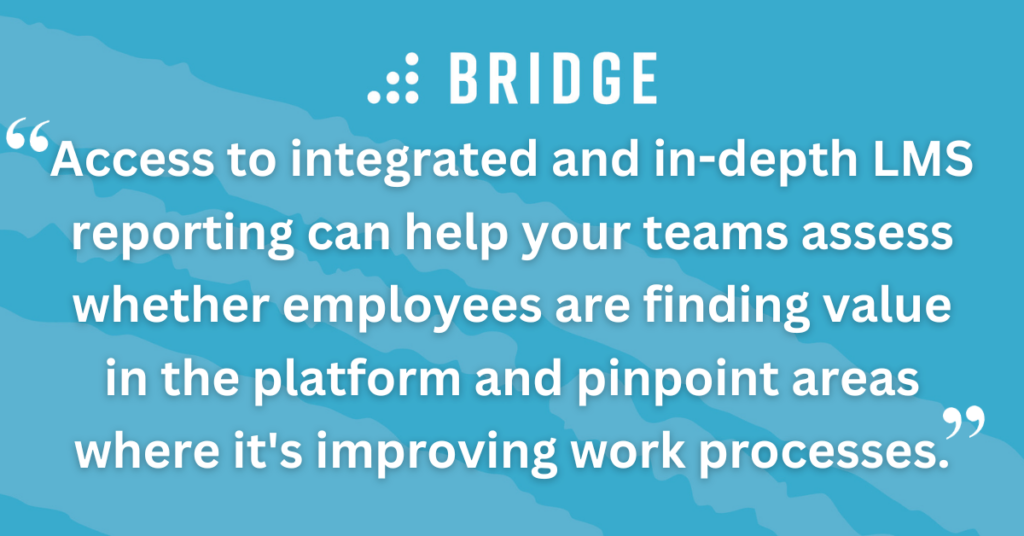
7) What Kind of Reports and Data Visualizations Can Admins Create?
An LMS with configurable, easy-to-use learning reporting and analytics makes it easy for L&D teams to track and demonstrate the value of training and development programs.
In addition, access to integrated and in-depth LMS reporting helps IT teams assess whether employees are finding value in the platform and pinpoint areas where the platform is improving productivity.
You'll want to ask about reporting and analytics capabilities, such as:
- Accurate, real-time reporting and data visualizations
- Custom reports and dashboards
- The ability to export and distribute reports
- Dedicated manager dashboards
- Sources of learner data captured
LEARN HOW TO DO MORE WITH YOUR DATA | ‘The Power of Learning Analytics to Drive Decisions and Growth’
8) How Will the Platform Support My Organization’s Upskilling and Employee Development Strategy?
The right solution will give L&D teams a wealth of options for leveraging learning data to target employee training and upskilling programs.
A platform that combines employee development, performance, and upskilling features drives strategic L&D decisions, allowing teams to preempt skills gaps, proactively target learning, and make development more actionable and measurable.
Find out what tools will support organizational growth. For example:
- Employee development plans
- Continuous feedback
- In-the-moment skills insights
- Skills taxonomies
User Experience
When weighing software solutions, consider your employees' needs and preferences.
9) Is the Platform Intuitive for End Users?
User experience can make or break the success of a software investment. An LMS must meet learners' requirements and add value to encourage adoption and long-term use.
Enquire how an LMS will encourage training and personalize the learning experience.
For example, you might want a platform with some of the following:
- The ability for learners to search for courses
- Personalized content recommendations
- Career development plans
- Peer learning and collaboration
- Employee feedback and recognition
RELATED READING | ‘How to Roll Out New HR Software to Employees: 8 Ways to Make Sure Teams Use It’
10) Can the LMS Be Used on a Mobile Device?
An LMS with access to a native mobile app can provide you with the same level of visibility and security while delivering a consistent learning experience for your people.
Look for a mobile app with seamless and uninterrupted access to content to give users a flexible and personalized learning experience.
Additionally, make sure an LMS mobile app has some of the following features:
- Support for multiple operating systems
- Mobile analytics
- Offline access
- Push notifications and reminders
Ready to Find a New LMS?
Bridge's LMS combines the essential elements of your learning, employee development, and upskilling strategies into a single solution.
To learn more about how Bridge's LMS can support your organization, reach out or request a demo.
